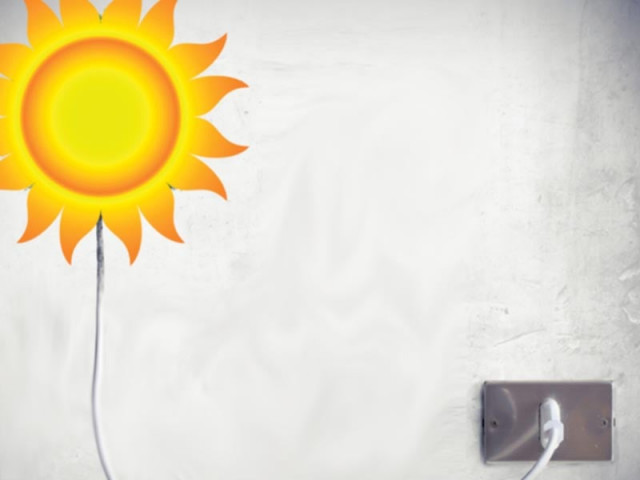Solar generators: Demand rises ahead of summer
Dealers in solar equipment say they are getting more customers as costs decline.

A decline in the price of solar panels and soaring electricity bills are causing a rising number of people to consider solar generators and solar UPS systems at their homes ahead of the summer, say dealers in alternative energy equipment.
Muhammad Ramzan, who imports and installs solar electricity systems, told The Express Tribune that he had sold three 3KVA solar panels in his first two years of business. “This year I have already installed two 3KVA systems and it’s not even summer,” he said, adding that he was also currently in contact with 15 other prospective clients.
Ramzan got into solar energy in 2007, when he bought a 1KVA solar panel home from China. In 2009, he started importing inverters from Taiwan and panels and batteries from China to assemble solar generators. “These are assembled according to the customer’s needs,” he said.
He says the decreasing price is behind the rising demand. “Last year a 3KVA generator cost about Rs900,000. This year the unit price of solar panels has fallen, so the price ranges between Rs700,000 and Rs800,000,” said Ramzan.
Naveed Ahmad runs a solar UPS/generator business in Layyah and also installs systems in Lahore. “I would say demand is double this year because of the per unit watt price drop. One solar watt cost about Rs300 last year. Now it is Rs160-170. A lot more people are noticing,” he said.
Shehzad Qureshi, a dealer at Hall Road, said that he was getting more queries from customers about solar technology now. “Still, we really need to raise awareness about solar energy,” he said.
Saqib Nisar had a 1,200-watt hybrid system installed at his house in 2011. He said that the system was enough to sustain appliances like fans, light bulbs and televisions, but could not support energy-intensive appliances like air conditioners.
He said that solar energy was currently not viable, but the price was coming down. “In 2006, the cost per watt was $4-5. It has now come down to $1.6-2. It is the future,” he said.
Naeem Ahmad Bajwa owns a solar water heater at his home, but feels that the per unit cost is not low enough yet for him to install other solar energy equipment. “A solar watt costs about Rs200 right now, at which rate it will take me 10 years to recover the cost in terms of savings in electricity bills,” he said. He suggested that the government subsidise solar power to encourage its use in Pakistan.
Rafay Alam, chairman of the Lahore Electricity Supply Company board of governors and a solar power user, said he was trying to see if banks would finance the purchase of solar generators by LESCO so they could produce energy and sell it to consumers at a higher tariff.
“LESCO has a rich-consumer base that would be willing to pay extra to receive uninterrupted electricity. The money saved by not consuming grid electricity could be used to repay the banks. And I don’t see why not: they finance 25KVA diesel generators all the time,” he said.
He said that Lesco rules did not prohibit the production of renewable energy though it is an electricity supply company.
Alam said that he has a 3KVA solar generator and had his house re-wired so the lights, fans, computers, fridge, freezer and television are all supplied by the generator around the clock. He said his consumption of grid electricity had fallen by half.
Ibrahim Khan of SRS solar solution, a company that offers alternative energy solutions to industries, said that solar power was a particularly good idea for remote rural areas where there was no electricity infrastructure and low power demand, mostly for fans, lighting and water pumps. He said he was planning to launch such a project soon with international funding.
Khan said that in order to get the most out of a solar generator at home, people should get the best equipment. “People buy Chinese brands which are cheaper. The European products are 60 to 70 per cent more expensive, but they are also more advanced and effective,” he said.
Rs231,000
is the estimated cost of a 1KVA solar generator (Rs45,500 for a hybrid inverter, Rs145,000 for solar panels and Rs41,000 for batteries). It generates about 800 watts, enough to run two fans, six lights, a laptop and a TV.
Rs690,000
is the estimated cost of a 3KVA solar generator (Rs131,000 for a hybrid inverter, Rs436,000 for solar panels and Rs123,000 for batteries). It generates about 2,400 watts, enough for a one tonne air conditioner, a fridge, a washing machine and several fans and lights.
*Estimates provided by Muhammad Ramzan, a dealer in solar power equipment.
Published in The Express Tribune, March 11th, 2012.


















COMMENTS
Comments are moderated and generally will be posted if they are on-topic and not abusive.
For more information, please see our Comments FAQ